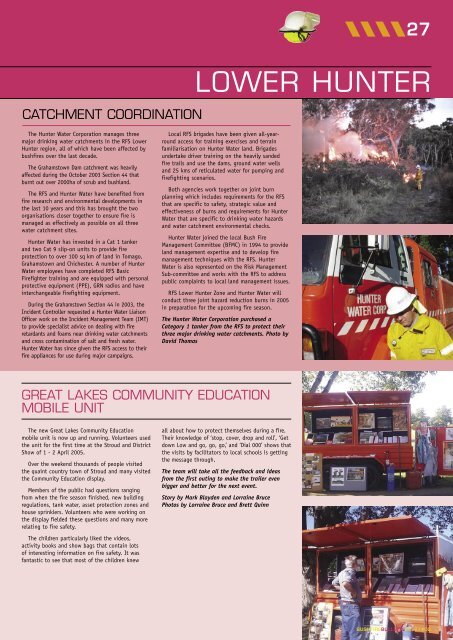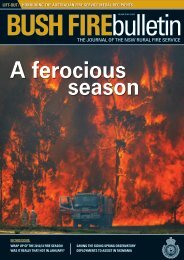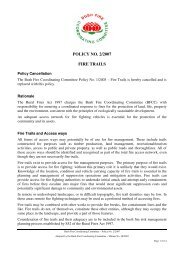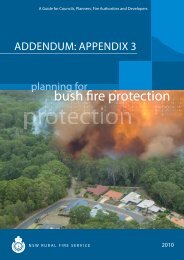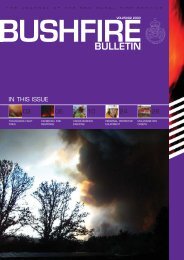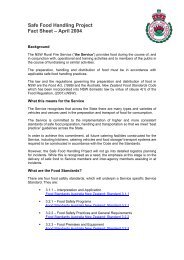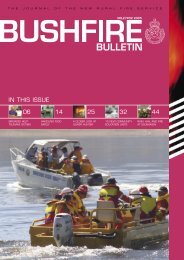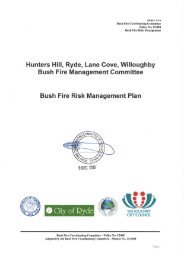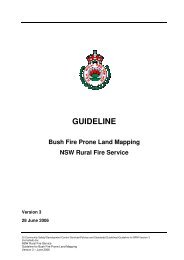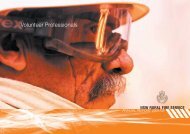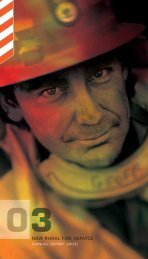to view - NSW Rural Fire Service
to view - NSW Rural Fire Service
to view - NSW Rural Fire Service
Create successful ePaper yourself
Turn your PDF publications into a flip-book with our unique Google optimized e-Paper software.
27<br />
CATCHMENT COORDINATION<br />
LOWER HUNTER<br />
The Hunter Water Corporation manages three<br />
major drinking water catchments in the RFS Lower<br />
Hunter region, all of which have been affected by<br />
bushfires over the last decade.<br />
The Grahams<strong>to</strong>wn Dam catchment was heavily<br />
affected during the Oc<strong>to</strong>ber 2003 Section 44 that<br />
burnt out over 2000ha of scrub and bushland.<br />
The RFS and Hunter Water have benefited from<br />
fire research and environmental developments in<br />
the last 10 years and this has brought the two<br />
organisations closer <strong>to</strong>gether <strong>to</strong> ensure fire is<br />
managed as effectively as possible on all three<br />
water catchment sites.<br />
Hunter Water has invested in a Cat 1 tanker<br />
and two Cat 9 slip-on units <strong>to</strong> provide fire<br />
protection <strong>to</strong> over 100 sq km of land in Tomago,<br />
Grahams<strong>to</strong>wn and Chichester. A number of Hunter<br />
Water employees have completed RFS Basic<br />
<strong>Fire</strong>fighter training and are equipped with personal<br />
protective equipment (PPE), GRN radios and have<br />
interchangeable firefighting equipment.<br />
During the Grahams<strong>to</strong>wn Section 44 in 2003, the<br />
Incident Controller requested a Hunter Water Liaison<br />
Officer work on the Incident Management Team (IMT)<br />
<strong>to</strong> provide specialist advice on dealing with fire<br />
retardants and foams near drinking water catchments<br />
and cross contamination of salt and fresh water.<br />
Hunter Water has since given the RFS access <strong>to</strong> their<br />
fire appliances for use during major campaigns.<br />
Local RFS brigades have been given all-yearround<br />
access for training exercises and terrain<br />
familiarisation on Hunter Water land. Brigades<br />
undertake driver training on the heavily sanded<br />
fire trails and use the dams, ground water wells<br />
and 25 kms of reticulated water for pumping and<br />
firefighting scenarios.<br />
Both agencies work <strong>to</strong>gether on joint burn<br />
planning which includes requirements for the RFS<br />
that are specific <strong>to</strong> safety, strategic value and<br />
effectiveness of burns and requirements for Hunter<br />
Water that are specific <strong>to</strong> drinking water hazards<br />
and water catchment environmental checks.<br />
Hunter Water joined the local Bush <strong>Fire</strong><br />
Management Committee (BFMC) in 1994 <strong>to</strong> provide<br />
land management expertise and <strong>to</strong> develop fire<br />
management techniques with the RFS. Hunter<br />
Water is also represented on the Risk Management<br />
Sub-committee and works with the RFS <strong>to</strong> address<br />
public complaints <strong>to</strong> local land management issues.<br />
RFS Lower Hunter Zone and Hunter Water will<br />
conduct three joint hazard reduction burns in 2005<br />
in preparation for the upcoming fire season.<br />
The Hunter Water Corporation purchased a<br />
Category 1 tanker from the RFS <strong>to</strong> protect their<br />
three major drinking water catchments. Pho<strong>to</strong> by<br />
David Thomas<br />
GREAT LAKES COMMUNITY EDUCATION<br />
MOBILE UNIT<br />
The new Great Lakes Community Education<br />
mobile unit is now up and running. Volunteers used<br />
the unit for the first time at the Stroud and District<br />
Show of 1 - 2 April 2005.<br />
Over the weekend thousands of people visited<br />
the quaint country <strong>to</strong>wn of Stroud and many visited<br />
the Community Education display.<br />
Members of the public had questions ranging<br />
from when the fire season finished, new building<br />
regulations, tank water, asset protection zones and<br />
house sprinklers. Volunteers who were working on<br />
the display fielded these questions and many more<br />
relating <strong>to</strong> fire safety.<br />
The children particularly liked the videos,<br />
activity books and show bags that contain lots<br />
of interesting information on fire safety. It was<br />
fantastic <strong>to</strong> see that most of the children knew<br />
all about how <strong>to</strong> protect themselves during a fire.<br />
Their knowledge of ‘s<strong>to</strong>p, cover, drop and roll’, ‘Get<br />
down Low and go, go, go,’ and ‘Dial 000’ shows that<br />
the visits by facilita<strong>to</strong>rs <strong>to</strong> local schools is getting<br />
the message through.<br />
The team will take all the feedback and ideas<br />
from the first outing <strong>to</strong> make the trailer even<br />
bigger and better for the next event.<br />
S<strong>to</strong>ry by Mark Blayden and Lorraine Bruce<br />
Pho<strong>to</strong>s by Lorraine Bruce and Brett Quinn<br />
BUSHFIREBULLETINVOL27#02


